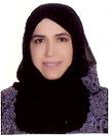
Mahera Abdulrahman
Dubai Health Authority, Dubai, United Arab Emirates
Biography
Dr Mahera previously held several positions at the Dubai Health Authority (DHA), most recently as head of Research Section within the DHA. She has also acted as an head of research support unit, and chair of metabolic genetics lab. Dr Mahera has also played an important role in leading several research projects within DHA, mainly focused on Genetic studies on UAE population and medical education. In addition, she actively established links between DHA and other organizations both nationally and internationally. In addition to her extensive professional career, Dr Mahera is a dedicated academic and has initiated the “Residency Research Program” in DHA since 2011. Dr Mahera is regularly invited to lecture at prestigious institutions, and to speak at various medical conferences. Her work has also been published in international journals, and presented at several conferences. Dr Mahera obtained her Medical degree and then her Master in Molecular pathology from Kuwait University in 2003 and earned her Doctor of Philosophy in Clinical Genetics at UK in 2007. Dr Mahera was recognized with the Best Research Award by the prestigious Sheikh Sultan Bin Khalifa Award on 2013 for Excellence for Distinguished research on genetics.
Abstract
United Arab Emirates initiated the colorectal cancer (CRC) screening on 2013. Yet, one of the barriers to participation in CRC screening is lack of knowledge about the importance of CRC, its risk factors, and the benefits that could be gained through screening. We aimed in this study to identify knowledge, attitude, and behavioral factors among the public that are associated with willingness to undergo CRC screening. A structured bilingual questionnaire in English and Arabic was designed by a multidisciplinary team and through a review of the literature. The survey consisted of four functional domains: socio-demographic characteristics, knowledge, attitude, and practice related questions. It was encouraging that more than 65% of the total participants surveyed for the study were aware of CRC and their main source of information was media (395, 66%). However, the majority (379, 64%) were thinking that CRC is not common, and did not hear of the screening test for CRC (401, 67%). An overall evaluation of the answers revealed a poor level of knowledge on risk factors of CRC, and only 40% correctly identified fecal occult blood as main test for CRC prevention. Surprisingly, 95% of participants mentioned that the CRC screening was not recommended to them by a physician. This is the first report analyzing the awareness, attitude and practice of UAE population and assessing the barriers for CRC screening. Our results demonstrate that better education and communication of the benefits of early detection of CRC should be addressed to improve the screening in UAE population. There is need for campaigns and educational programs, both for health care providers and public. Media might play a significant role in this aspect and new policies need to focus more on increasing community awareness on cancer preventive measures in UAE.
Table 1. Variation in selected knowledge, attitudinal, and practice variables according to sociodemographic characteristics among adults in UAE (n=600).
|
Variable |
In your opinion, is colorectal cancer treatable if detected early |
|||||
|
|
|
|
|
|
|
|
|
|
|
n (%) |
|
|
P Value |
|
|
|
|
|
|
|
||
|
Education level |
Yes |
|
No |
|
||
|
|
|
|
|
|
|
|
|
Illiterate/primary school |
12 |
(2) |
|
4 |
(6) |
0.0001 |
|
High school |
133 |
(22) |
|
24 |
(39) |
|
|
University |
351 |
(59) |
|
27 |
(44) |
|
|
Postgraduate |
103 |
(17) |
|
7 (11) |
|
|
|
|
|
|
|
|||
|
|
If advised by your doctor, would you get screened for Colorectal Cancer |
|||||
|
|
|
|
|
|
|
|
|
Education level |
Yes |
|
No |
|
||
|
|
|
|
|
|
|
|
|
Illiterate/primary school |
10 |
(2) |
|
2 |
(3) |
0.01 |
|
High school |
104 |
(20) |
|
28 |
(37) |
|
|
University |
315 |
(61) |
|
33 |
(44) |
|
|
Postgraduate |
91 (18) |
|
12 |
(16) |
|
|
|
|
|
|
|
|
||
|
Occupation |
Yes |
|
No |
|
||
|
|
|
|
|
|
|
|
|
Student |
77 (15) |
|
9 (12) |
0.03 |
||
|
Housewife |
31 |
(6) |
|
4 |
(5) |
|
|
Business owner |
12 |
(2) |
|
|
0 |
|
|
Managerial or professional |
243 |
(47) |
|
27 |
(36) |
|
|
Intermediate occupation |
128 |
(25) |
|
21 |
(28) |
|
|
Lower supervisory/technical |
10 |
(2) |
|
11 |
(15) |
|
|
Semi-routine occupation |
17 |
(3) |
|
2 |
(3) |
|
|
|
|
|
|
|
|
|
*p < 0.05, significance determined using Montecarlo 2 tailed significance at 95% CI. Only significant results are presented.